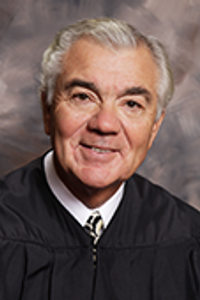Tom Chambers
Tom Chambers was an associate justice on the Washington Supreme Court. He was first elected in 2000 and then subsequently re-elected in 2006. He retired at the end of 2012 and died in December 2013.[1][2]
Education
Chambers received his J.D. from the University of Washington School of Law in 1969. Prior to that, he attended Yakima Valley Community College and Washington State University.[3]
Career
Chambers was in private practice for 30 years prior to his election to the Washington Supreme Court.[3]
Approach to the law
"My parents taught me that solutions to problems should be grounded in common sense. Justice requires openness. My job is to protect your rights. I believe in open government. The brilliance of our constitution is in its checks and balances. The people are the ultimate check on government. Government must be conducted openly and its records must be available for inspection.”[4]
Awards and associations
Awards
- 2000-present Director and Honorary Director, Rise n' Shine Foundation
- 2006 Outstanding Judge of the Year, King County Washington Woman Lawyers
- 1999 Seattle Housing Authority Neighborhood House Good Neighbor Award for 20 Years of Commitment to Residents of Seattle Public Housing
- 1998 Yakima Valley Community College Distinguished Alumni Award
- 1996 Outstanding Trial Lawyer of the Year, American Board of Trial Advocates, Washington Chapter
- 1989 Outstanding Trial Lawyer of the Year, Washington State Trial Lawyers Association
- 1978-79 "Boss of the Year," Greater Seattle Legal Secretaries Association
Associations
- 1999-2001 Board Member, United Way of King County
- 1998-99 Providence Seattle Medical Center Foundation Board Member
- 1996-97 President, Washington State Bar Association
- 1993 President, American Board of Trial Advocates— State Chapter
- 1993 President, Damages Attorneys Round Table
- 1985-86 President, Washington State Trial Lawyers
2006 election
Chambers ran unopposed in the general election. [6]
In 2006, Chambers raised $341,625. Chambers himself was the top contributor with $114,992, or 33.66% of the total.[7]
Noteworthy cases
Doctors selling medication
In October 2006, Chambers wrote the majority opinion for the court which upheld the right of medical doctors in the state to sell medication. Physicians said the state Supreme Court ruling rejecting a unique interpretation of anti-kickback law in a "fen-phen" diet drug case will preserve access to a number of products for patients. But lawyers in the case say doctors could see more lawsuits trying to use state anti-kickback laws against them. The Washington high court found that the 1949 Washington anti-kickback statute was meant to forbid illegal referrals or "unearned" profits from a third party, but not to prevent doctors from making money off the goods that they provide directly to patients, whether medications or medical equipment. Criminalizing such sales would "lead to absurd consequences," including making patients criminally liable for buying drugs from doctors if the physicians profited from it.[8]
Political ideology
In October 2012, political science professors Adam Bonica and Michael Woodruff of Stanford University attempted to determine the partisan ideology of state supreme court justices. They created a scoring system in which a score above 0 indicated a more conservative-leaning ideology, while scores below 0 were more liberal.
Chambers received a campaign finance score of -1.36, indicating a liberal ideological leaning. This was more liberal than the average score of -0.91 that justices received in Washington.
The study was based on data from campaign contributions by the judges themselves, the partisan leaning of those who contributed to the judges' campaigns, or, in the absence of elections, the ideology of the appointing body (governor or legislature). This study was not a definitive label of a justice, but an academic summary of various relevant factors.[9]
External links
- Tom Chambers blog
- Washington Courts, Justice Tom Chambers
- Project Vote Smart, Justice Tom Chambers (WA)
- Tom Chambers: Opinions and Writings
- Follow the Money: Tom Chambers 2006
- The News Tribune, "State justice Tom Chambers to retire," January 15, 2012
- The Washington Supreme Court blog, an unofficial blog that covers the Washington State Supreme Court and its justices
Footnotes
- ↑ The News Tribune, "State justice Tom Chambers to retire," January 15, 2012
- ↑ The Seattle Times, "Tom Chambers, former state Supreme Court justice, dies," December 12, 2013
- ↑ 3.0 3.1 Washington Courts, Justice Tom Chambers
- ↑ Tom Chambers Website
- ↑ Tom Chambers' Website
- ↑ Washington Secretary of State, 2006 General Election Results
- ↑ Follow the Money: Tom Chambers.
- ↑ American Medical News, "Washington Supreme Court upholds doctor's right to sell medication," November 20, 2006
- ↑ Stanford University, "State Supreme Court Ideology and 'New Style' Judicial Campaigns," October 31, 2012




